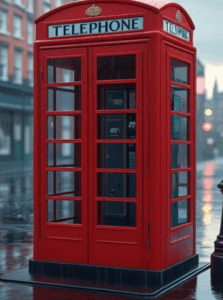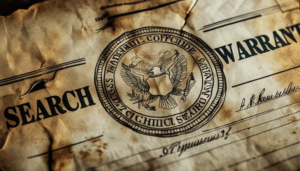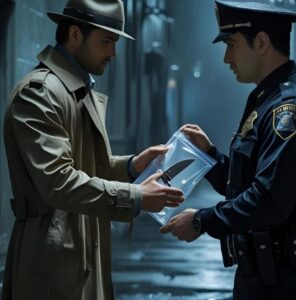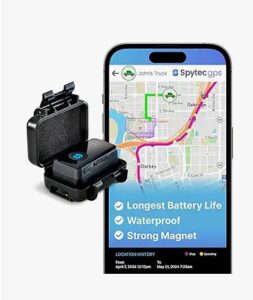By: Derek Kreymer

Katz v. United States
In 1967, a simple gambling operation conducted from Los Angeles phone booths would forever change how Americans understand privacy rights. The Supreme Court’s decision in Katz v. United States didn’t just alter constitutional law—it created the legal framework that private investigators use every single day.
When the FBI Went Too Far

Charles Katz thought he was being clever. Operating an illegal gambling business from public phone booths across Los Angeles, he believed the public nature of his “office” would protect him from scrutiny. The FBI had other ideas. Without obtaining a warrant, agents attached electronic listening devices to the outside of phone booths Katz frequented, recording his conversations and building the case that would ultimately convict him.
At first glance, this seemed like standard police work. The government argued that since Katz used public phone booths rather than his private home, and since agents never physically entered the booth, no Fourth Amendment violation had occurred. Lower courts agreed, following decades of precedent that focused on whether officers had physically trespassed on someone’s property.
The Supreme Court saw things differently.
The Change: People Over Places
In a 7-1 decision that would reshape privacy law, Justice Potter Stewart delivered a ruling that still echoes through courtrooms today. The Court explicitly rejected the old “trespass doctrine” that had governed Fourth Amendment cases for generations. No longer would constitutional protection depend on whether government agents physically invaded someone’s property.

Instead, the Court declared something revolutionary: “The Fourth Amendment protects people, not places.”
This wasn’t just legal philosophy—it was a practical recognition that privacy could exist anywhere, even in public spaces. Katz had entered the phone booth, closed the door, and paid for his call, clearly indicating his expectation that his conversation would remain private. The Court ruled that this expectation was reasonable, regardless of the public location.
The Harlan Test: Your Privacy Playbook
While Justice Stewart’s majority opinion broke new ground, it was Justice John Marshall Harlan’s concurrence that provided the practical framework courts still use today. Harlan’s two-part test for determining whether a “search” has occurred under the Fourth Amendment remains the gold standard:
1. Subjective Expectation of Privacy
The individual must demonstrate a personal expectation that the place or activity remains private. This means acting in ways that show a desire for privacy—closing doors, speaking quietly, choosing secluded locations.
2. Objective Expectation of Privacy
This subjective expectation must be one that society recognizes as “reasonable.” This represents an objective standard reflecting societal norms about what privacy we can reasonably expect.
The beauty of this test lies in its flexibility. Rather than being locked into 18th-century property concepts, the Fourth Amendment could adapt to new forms of surveillance and communication technology.
What This Means for Private Investigators
Here’s where things get interesting for PIs. The Fourth Amendment—and by extension the Katz test—is designed to protect individuals from governmental intrusion. Private investigators generally aren’t bound by these constitutional constraints because they’re not government actors.
But there’s a crucial exception that every PI must understand.
The Government Agent Exception

If a private investigator is deemed to be “acting as an instrument or agent of the government,” then Fourth Amendment protections apply. This happens when law enforcement directs, encourages, or participates in a warrantless search conducted by a private party.
When this agency relationship exists, the PI’s actions are treated as state action, and any evidence obtained in violation of the Fourth Amendment could be deemed inadmissible in court. The consequences can be severe—entire cases can collapse when evidence is thrown out.
The Independence Factor
Conversely, if a private investigator acts completely independently, without any government direction or involvement, police and prosecutors can potentially use any evidence found, even if law enforcement themselves would have needed a warrant to obtain it.
This creates both opportunity and responsibility for private investigators. While you have more operational freedom than police officers, you must carefully maintain your independence and understand when your actions might cross legal lines.
Practical Applications in the Field
Understanding Katz isn’t just academic—it’s essential for conducting lawful and effective investigations. Here’s how the reasonable expectation of privacy test applies to common PI activities:
Surveillance and Observation

Public Spaces: You’re generally on solid ground observing and photographing subjects in parks, on public streets, or in other open areas where anyone could observe the same activities. People have no reasonable expectation of privacy in truly public spaces.
Private Property: The analysis becomes more complex on private property. A person in their fenced backyard may have a reasonable expectation of privacy, but activities visible from a public vantage point typically don’t enjoy privacy protection.
The Gray Areas: Shopping malls, office buildings, and other quasi-public spaces require careful analysis. Consider the specific circumstances, the subject’s behavior, and societal norms about privacy in these locations.
Electronic Surveillance Challenges
The Katz decision has profound implications for PIs using electronic surveillance:
Audio Recording: Many states require all parties to consent to recording conversations. Even in one-party consent states, you must be careful not to record conversations where participants have a reasonable expectation of privacy.
Video Recording: While video surveillance of public activities is generally permissible, recording in areas where people have a reasonable expectation of privacy can lead to serious legal consequences.
GPS Tracking: Courts have applied Katz principles to GPS tracking, with many jurisdictions requiring consent or court orders for extended tracking, especially when it reveals private information about someone’s daily activities.

Navigating the Digital Age
Modern technology has created new applications of Katz principles that didn’t exist when the case was decided:
Social Media Intelligence

Publicly available social media posts generally don’t enjoy privacy protection, but accessing private accounts or using deceptive means to gain access raises significant legal issues.
Drone Surveillance
The use of drones for surveillance raises novel questions about reasonable expectations of privacy, particularly regarding aerial observation of private property.

Digital Forensics
PIs involved in digital investigations must understand how Katz principles apply to electronic communications and data storage.
Your Professional Playbook
Before beginning any surveillance operation, ask yourself these critical questions:
- Where am I conducting surveillance?
- What reasonable expectation of privacy does the subject have in that location?
- Are there alternative methods that would be less invasive?
- What are the specific state and local laws governing surveillance in this jurisdiction?
Documentation Matters
Maintain detailed records of your surveillance methods and locations. This documentation can help demonstrate that your investigations remained within legal boundaries and can be crucial if your methods are ever questioned in court.
Client Communication
Clearly explain to clients what activities are legally permissible and what could expose both you and your client to liability. This includes discussing the reasonable expectation of privacy test and how it applies to their specific situation.
State Law Variations
While Katz established federal constitutional minimums, many states have enacted stronger privacy protections. California’s privacy laws, for example, are significantly more restrictive than federal requirements. You must be familiar with the specific laws in your jurisdiction and any locations where you conduct investigations.
The Ethical Dimension
Beyond legal compliance, professional private investigators should consider the ethical implications of their surveillance methods. Industry organizations provide ethical guidelines that often incorporate privacy considerations rooted in Katz principles.
The key is striking the right balance: gathering necessary information for clients while respecting individuals’ legitimate privacy expectations and staying within legal boundaries.
The Continuing Evolution
The conversation about privacy and surveillance that began with Katz continues in courtrooms, legislatures, and public discourse across the country. As we work through the balance between security and privacy in the 21st century, the precedent set by this landmark case continues to shape how we understand the boundaries of government power and individual rights.
For private investigators, staying informed about these developments isn’t just good practice—it’s necessary for building successful practices that serve clients’ needs while maintaining the highest professional and legal standards.
Charles Katz’s phone booth may seem antiquated in an era of smartphones and social media, but the principle that emerged from his case—that privacy is a fundamental right deserving of constitutional protection—remains as vital today as it was in 1967.
The Bottom Line
Katz v. United States transformed privacy law by moving beyond physical trespass to focus on privacy expectations. This shift created a more flexible framework for constitutional analysis, and it also introduced new ambiguities that private investigators must handle carefully.
Understanding Katz and its applications allows you to conduct more effective investigations while minimizing legal risks. As technology continues to advance and privacy laws adapt, staying informed about these developments remains vital for professional success.
This blog post is for informational purposes only and does not constitute legal advice. Private investigators should consult with attorneys familiar with their jurisdiction’s specific laws and regulations.
References
YouTube : Expectation of Privacy: Katz v. United States | Criminal Law
National Constitutional Center https://constitutioncenter.org/the-constitution/supreme-court-case-library/katz-v-united-states
